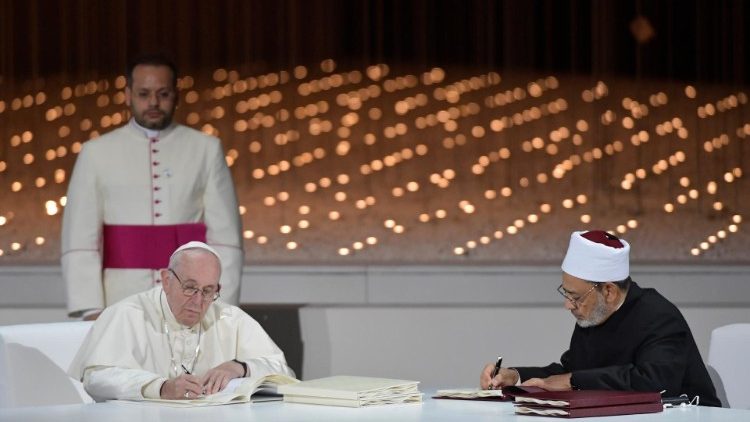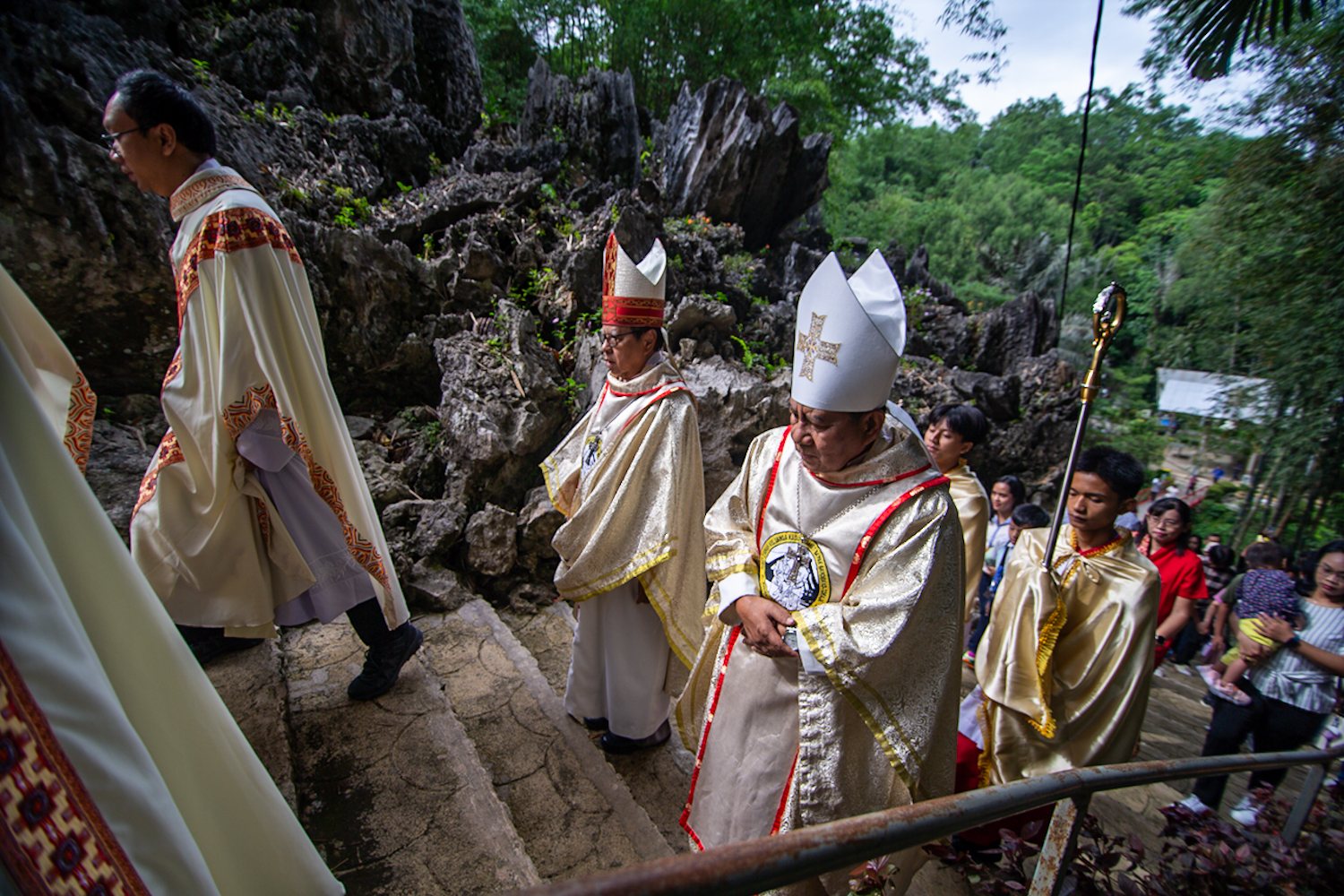(Above) Pope Francis and the Grand Imam of Al-Azhar, Ahmed el-Tayeb, sign a ‘Document on Human Fraternity for World Peace and Living Together’ during a global conference in Abu Dhabi, UAE, on February 4, 2019. Image source: Vatican News
Joaquim Magalhães de Castro
The United Nations annually celebrates the International Day of Human Fraternity on February 4, a day of significance marked by the signing of the Declaration on Human Fraternity by Pope Francis and the Grand Imam of Al-Azhar, a renowned scholar of the Islamic faith.
This celebration calls for the defense and promotion of justice, and the rights of all, so that we can – in the words of the Indian Jesuit priest Cedric Prakash, who a few days ago evoked this event in a statement to the Fides news agency – “truly live as brothers and sisters, in the dignity, peace, equity and love of our Common Home”.
This ecumenical document encourages believers around the world to get involved in research and reflection, in the most diverse academic sectors, in order to help prepare new generations for a culture of goodness and peace and defense of the rights of the oppressed and the most vulnerable. It was in this sense that, on the 3rd of February, the Secretariat for Social Justice and Ecology of the Society of Jesus organized a global webinar entitled “Fraternity and Frontiers” during which an interactive global map displayed the social centers of that institution, “promoters of justice, peace and fraternity among communities of different religions”.
In doing so, those responsible for the initiative limited themselves to responding to the challenge by Pope Francis who recently stated that fraternity is the simple gesture of “extending a hand to our fellow men, respecting them and listening to them with an open heart”.
One year after the Abu Dhabi Declaration (thus is known the agreement signed during the Holy Father’s apostolic journey to the United Arab Emirates in 2019), Pope Francis released to the world the encyclical Fratelli Tutti, a revolutionary text, precisely on fraternity and social friendship. In it, the Holy Father calls for dialogue between all people of good will, regardless of their religious beliefs.

2021 Report: Violence Against Women in Pakistan’s Punjab
- Total number of cases: 9,734
- Rapes: 4,598
- Domestic violence: 1,415
- Acid burns: 34
- “Honor killings”: 197
*Data from the Commission on the Status of Women in Punjab, Pakistan. Image: Karolina Grabowska@pexels.com
“Fratelli Tutti proposes a roadmap for us to become more fraternal, starting from the recognition of the fundamental dignity of each person,” recalls Father Cedric Prakash, for whom the mentioned document is a true Magna Carta, “a path to follow for all humanity”. This, if we really want to overcome hatred, division and violence. And in that region of the planet, today, more than ever, commitment is necessary. In her recent book titled Politics of Hate, Pakistani-American writer Farahnaz Ispahani describes the environment marked by hatred that religious extremism fosters in the Indian subcontinent.
Of course, for fraternity to exist, respect for the individual’s freedom of choice becomes essential. Phenomena such as ‘conversion without consent’ constitute thick walls that prevent the desired approximations. In a report presented in the last days of 2022 by the Pakistani NGO “Voice for Justice” in collaboration with its international counterpart “Jubilee Campaign”, for example, there were 100 cases of kidnapping, forced religious conversions, forced and early marriages of girls and women belonging to the Christian community in Pakistan. These cases occurred in the period between January 2019 and October 2022 alone. Of the total cases, 86% occured in Pakistan’s province of Punjab.
“The phenomenon of forced conversions reveals the inability of the State to implement and enforce existing laws aimed at preventing kidnapping, early marriages and forced marriages, especially when the victims come from minority religious communities,” says Joseph Jansen, president, “Voice for Justice”. Jansen calls for the introduction, as soon as possible, of “a law that punishes this crime and prevents it, in accordance with the norms of human rights”.
The report ‘Conversion Without Consent’ highlights the cases of some Christian minors who suffered serious abuse. One of them was “drugged, raped, beaten with a stick, burned with cigarettes” and another, after receiving the same treatment, was forced to marry and change her religion. The report shows that 61% of girls were abducted before reaching the age of 16, but their ages are often falsified to avoid criminal conviction of their abductors. As a general rule, perpetrators of these acts enjoy complete impunity.
Of course, the local Church made its vehement protest. Monsignor Indrias Rehmat, a Catholic bishop of Faisalabad, called for the need to implement legal and administrative measures “that strengthen the rule of law, combat impunity and guarantee fundamental freedoms for all without discrimination”. According to data from the Commission on the Status of Women in Punjab, there has been a general increase in violence against women: in 2021, 9,734 incidents were recorded in Punjab province, of which 4,598 were rapes, 1,415 cases of domestic violence, 34 acid burns, and 197 “honor killings”.


 Follow
Follow


